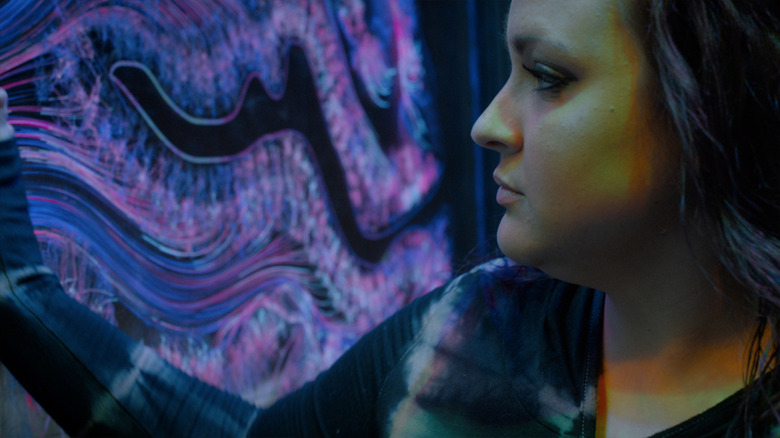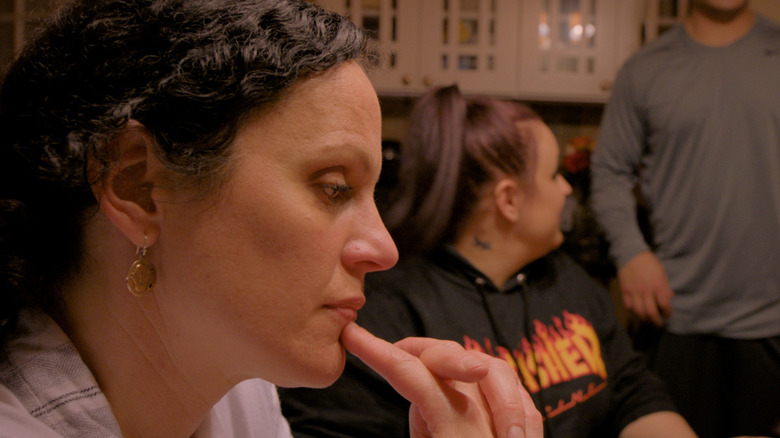Our American Family Review: Love, Drugs, And Generational Trauma
Addiction is a scourge on America; it ruins lives, devastates families, and leaves gaping psychic wounds that, in many cases, never heal. This is true whether it's opioid addiction, alcoholism, or an eating disorder. And when it comes to families, the pain and suffering are often passed down, generation to generation.
The 2022 documentary "Our American Family," directed and produced by Hallee Adelman and Sean King O'Grady, shows how for one close-knit Philadelphia family, this reality is all too familiar. Viewers meet the documentary's subjects at a pivotal point in their lives: Nicole is a young mother in rehab who, several months earlier, nearly died of an overdose while alone with her two-year-old daughter, Giovanna. The toddler is now under the care of Nicole's mother Linda and stepfather Brian. Also living in the home is Nicole's brother Chris, who has his own mental health and addiction struggles. Linda herself is a recovering addict who grew up under the shadow of her mother's all-consuming eating disorder. At this point, everyone is fed up with the never-ending rollercoaster of drama and pain that has come to define their lives.
There's a dizzying contrast in "Our American Family" between the markers of domestic comfort and the clear signs of deep-seated frustration, rage, and pain. This is a big, loving family in what is obviously a lived-in house. There are numerous scenes of the adult children and their parents sitting around a kitchen table, talking — just like any other typical, nuclear American family. The house is slightly messy in the way that screams authenticity — with bottles of coffee mate and containers of pastries reminding the audience that this isn't a staged set. It's a home.
'Finding empowerment in the pain'
This isn't a groundbreaking documentary. We've seen this basic subject covered before, whether it be in Netflix's "Heroin(e)" and "Recovery Boys," or the HBO documentaries "Thin" and "Risky Drinking." Having said that, it is nice to see the focus on a specific family unit. The generational angle — at least in this format — feels different. Whereas so many of these films focus on just the individuals struggling with substance abuse and their own personal histories, "Our American Family" takes a step back to see the bigger picture.
The people at the center of the documentary are caught between worlds. On the one hand, the parents live in a nice, modest house. They're hard-working blue-collar types; while not affluent, they seem comfortable — at least financially, if not mentally. On the other hand, their adult children are very much stuck. It's clear that Linda and Brian want the best for their children, but at the same time, they're not getting to enjoy the things they've worked so hard for. Chris is clearly resentful of his sister, both for demanding so much attention and for putting herself in danger. Nicole matches this resentment with her own defensiveness and anger — but it's obvious that underneath that is a world of hurt.
There's a lot of nuance in "Our American Family" that really makes the story compelling without ever feeling exploitative. We're coming in as the recovery is in process — a nice change of pace from other similar documentaries (and especially reality programs like "Intervention") that almost revel in displaying self-destructive behavior. The focus is instead on highlighting the love and the hurt, and doing so in a way that is raw and honest while still being dignified. As Nicole says about her recovery, it's all about "finding empowerment in the pain."
'She hurt when she breathes'
"Our American Family" is full of poignant moments that really capture the suffering a family goes through because of addiction. There's a particularly devastating exchange between Linda and Brian, with her begging her partner to show his stepdaughter some basic compassion. Brian thinks Nicole needs to "feel bad" in order to recover, but as Linda points out, she is suffering, and it's all-consuming and unending: "she feels bad when she wakes up [...] she feels bad when she breathes." Even more cutting is his response; it's clear that it's just been too much, for too long. He didn't sign up to raise a toddler at this stage in his life, and he can't keep going through the cycle of Nicole going to rehab, being sober for a period, then relapsing. He's angry, but more so, he seems worn down.
Families don't become like this overnight. It's been years of a vicious cycle, and while they seem poised to finally break it and move on, it's understandable why there's so much hesitancy and skepticism. Nicole is funny, bold, and feisty, but she also is wounded and vulnerable. It's something she inherited: As Linda explains in a voiceover, "the demon that ran through my mother runs through Nicole."
What's impressive about "Our American Family" is the documentary's capacity to take a very sad circumstance and make it feel relatable. The mission here isn't to get gratification from watching suffering; the tone is hopeful, and the focus is on the family's love, not their pain. It's one story that provides a mere snapshot of a larger problem in the U.S. — but it's a very detailed picture, and one that humanizes the people behind the addictions.
/Film Rating: 7 out of 10


